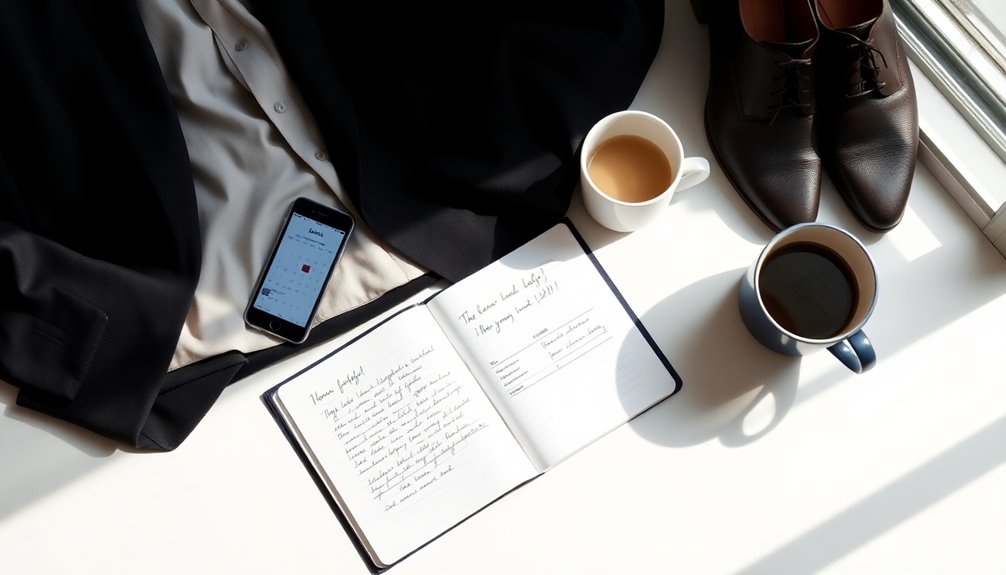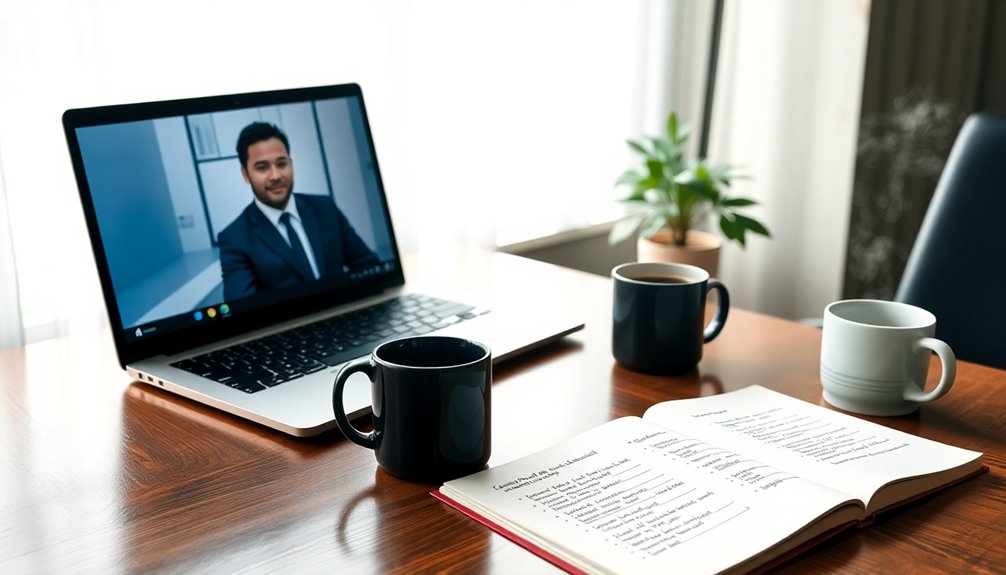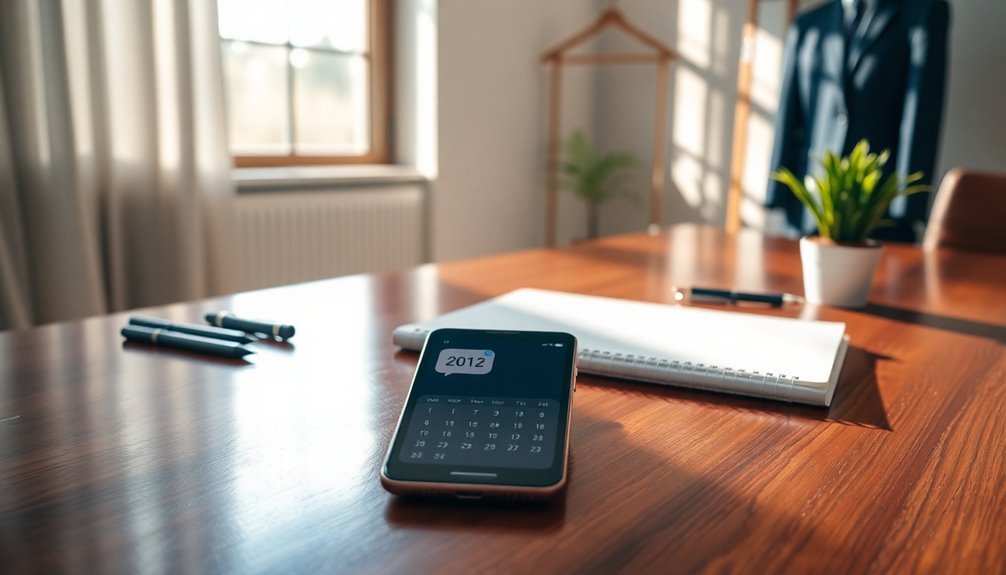Mastering the interview is essential for your career success. Start by researching the company culture and the specific role you've applied for. Prepare by practicing common interview questions, especially behavioral and situational ones, to showcase your skills and experiences effectively. Remember to prepare thoughtful questions that engage the interviewer and reflect your interest. After the interview, follow up with a thank-you email to leave a strong impression. Whether you face a phone, technical, or behavioral interview, understanding each type will enhance your readiness. Stay tuned for more tips and strategies that can boost your interview game.
Key Takeaways
- Thoroughly research the company and role to align your skills with their values and expectations.
- Practice common and behavioral interview questions to enhance your confidence and clarity during discussions.
- Prepare insightful questions to engage the interviewer and demonstrate genuine interest in the position.
- Follow up with a personalized thank-you email within 24 hours to reinforce your interest and professionalism.
- Reflect on your interview performance to identify strengths and areas for improvement for future opportunities.
Overview of the Interview Process

In the dynamic landscape of job hunting, understanding the interview process is essential for success. This multistep practice allows companies to screen and hire employees, often featuring various stages tailored to the industry, position, and organization.
Your goal is to stand out as a suitable candidate by showcasing your skills, experience, and cultural fit. Preparation and research are vital; they enable you to enhance your performance and demonstrate your interest.
Remember, the process isn't just about impressing the interviewer, but also about evaluating if the company aligns with your values and career goals. Developing strong communication skills can significantly enhance your clarity and rapport during interviews.
Stay aware of the feedback loop, as it provides valuable insights for future improvements in your interview approach.
Key Steps in Interview Preparation

Preparing for an interview involves several key steps that can greatly enhance your chances of success.
First, research the company, its culture, and the specific role to understand what they value.
Next, review the job description carefully and match your skills and experiences to their requirements.
Then, practice answering common interview questions, focusing on both behavioral and situational types.
You should also prepare thoughtful questions to ask the interviewer, demonstrating your interest in the position.
Finally, gather necessary materials, like copies of your resume and references, and plan your attire to align with the company's dress code.
Taking these steps will help you approach the interview with confidence and clarity. Additionally, consider practicing your responses in front of video recordings to assess your delivery and body language.
Types of Interviews Explained

There are several types of interviews you might encounter during the hiring process, each designed to assess different aspects of your qualifications.
The screening interview often serves as a preliminary check to determine if you meet basic requirements. Phone interviews help narrow down candidates for in-person meetings, especially for remote roles.
Technical interviews focus on your specific skills and problem-solving abilities relevant to the job. Behavioral interviews explore your past experiences and how you've handled various situations.
Finally, the final interview typically discusses salary, benefits, and company culture, allowing you to make a strong impression before the decision is made.
Understanding these types can help you prepare effectively and tailor your approach accordingly.
Common Interview Questions

Understanding the types of interviews is just the beginning; knowing what questions to expect can greatly enhance your preparedness.
Familiarizing yourself with common interview questions helps you craft thoughtful responses. Here are three types you should prepare for:
- Behavioral Questions: These ask you to share past experiences, so have specific examples ready that highlight your skills.
- Situational Questions: These pose hypothetical scenarios, testing your critical thinking. Think through possible responses connected to your experience.
- General Questions: Expect inquiries about your career goals and background. Researching the company will help you tailor your answers.
Effective Post-Interview Actions

After the interview, taking effective post-interview actions can considerably influence your chances of landing the job. Start by sending a personalized thank-you email within 24 hours, expressing gratitude for the opportunity and reiterating your interest. It keeps you fresh in the interviewer's mind. Next, reflect on your performance to identify strengths and areas for improvement. Finally, prepare for the next steps by staying informed about the company's hiring timeline.
| Action | Purpose | Timing |
|---|---|---|
| Send a thank-you email | Reinforce interest | Within 24 hours |
| Reflect on performance | Identify areas for growth | Soon after the interview |
| Follow up | Check on application status | 1-2 weeks later |
Understanding Job Offers

A job offer represents a significant milestone in your career journey, but it's crucial to approach it with a critical eye.
Before you rush to accept, take a moment to evaluate the details carefully. Consider the following key aspects:
- Salary and Compensation: Verify that the offered salary aligns with industry standards and your personal financial goals.
- Benefits and Perks: Review health insurance, retirement plans, and any additional perks that could impact your overall job satisfaction.
- Work-Life Balance: Assess the company's culture regarding work hours, remote work options, and vacation policies.
Statistics and Resources for Success

Statistics reveal that the average hiring process typically involves 2-3 interviews, though this can vary widely depending on the industry and specific role. Understanding these statistics can help you prepare effectively. For instance, group interviews are on the rise, emphasizing the need for strong communication skills.
Here's a quick reference table on interview statistics and resources:
| Statistic/Resource | Details |
|---|---|
| Average Interviews per Hire | 2-3 |
| Common Interview Types | Screening, Technical, Behavioral |
| Follow-Up Importance | Reinforces interest in position |
| Resources for Preparation | Guides, Mock Interviews, FAQs |
Utilizing these insights and resources can greatly enhance your chances of success in the interview process. Additionally, establishing clear savings goals can provide financial stability that reduces stress during job transitions.
Frequently Asked Questions
How Should I Dress for an Interview?
When you're preparing for an interview, dressing appropriately is key.
Opt for professional attire that aligns with the company's culture. A suit or tailored dress works well for formal environments, while smart casual may be suitable for more relaxed settings.
Make certain your clothes are clean and pressed.
Don't forget about grooming; neat hair and minimal accessories can make a positive impression.
What if I'm Late to My Interview?
So, you've decided to make a grand entrance by being late to your interview—how bold!
But seriously, if you find yourself running behind, call the interviewer as soon as possible. Apologize sincerely and provide a brief reason for your delay.
Once you arrive, focus on being composed and confident. Remember, everyone has off days; how you handle it can reflect your adaptability and professionalism.
Just don't make it a habit!
Can I Bring Notes to the Interview?
Yes, you can bring notes to the interview! In fact, it can be a smart move. Having key points or questions written down helps you stay organized and focused.
Just make sure your notes are discreet and don't distract you from the conversation. Practice reviewing them beforehand so you can use them naturally.
Showing that you've prepared can impress your interviewer and demonstrate your genuine interest in the position and company.
How Long Should I Wait for Feedback?
After your interview, it's generally a good idea to wait about one week for feedback.
If you haven't heard anything after that, it's perfectly fine to follow up politely.
Companies often have multiple candidates to evaluate, so patience is key.
Remember, clear communication from them can sometimes take longer than expected.
What Should I Do if I'm Nervous?
Feeling nervous before an interview? You're not alone!
To manage that anxiety, practice deep breathing and visualize success. Prepare thoroughly by researching the company and role, so you feel more confident. Mock interviews with friends can help you get comfortable answering questions.
Conclusion
To sum up, mastering the interview process is like sharpening a knife; the more you prepare, the better you'll slice through challenges. By understanding the steps to take, familiarizing yourself with different interview types, and crafting thoughtful questions, you'll present your best self. Remember, every interview is a two-way street—it's your chance to gauge if the company fits your goals. So, embrace the journey, stay confident, and you'll be well on your way to landing that dream job!
Eugene brings a fresh, dynamic voice to our platform as one of our talented Writers. Specializing in research-driven content, he explores the latest findings in psychology and personal growth, translating them into actionable insights for our readers. Eugene’s work is fueled by a curiosity about what makes us tick and a desire to help others unlock their potential.










